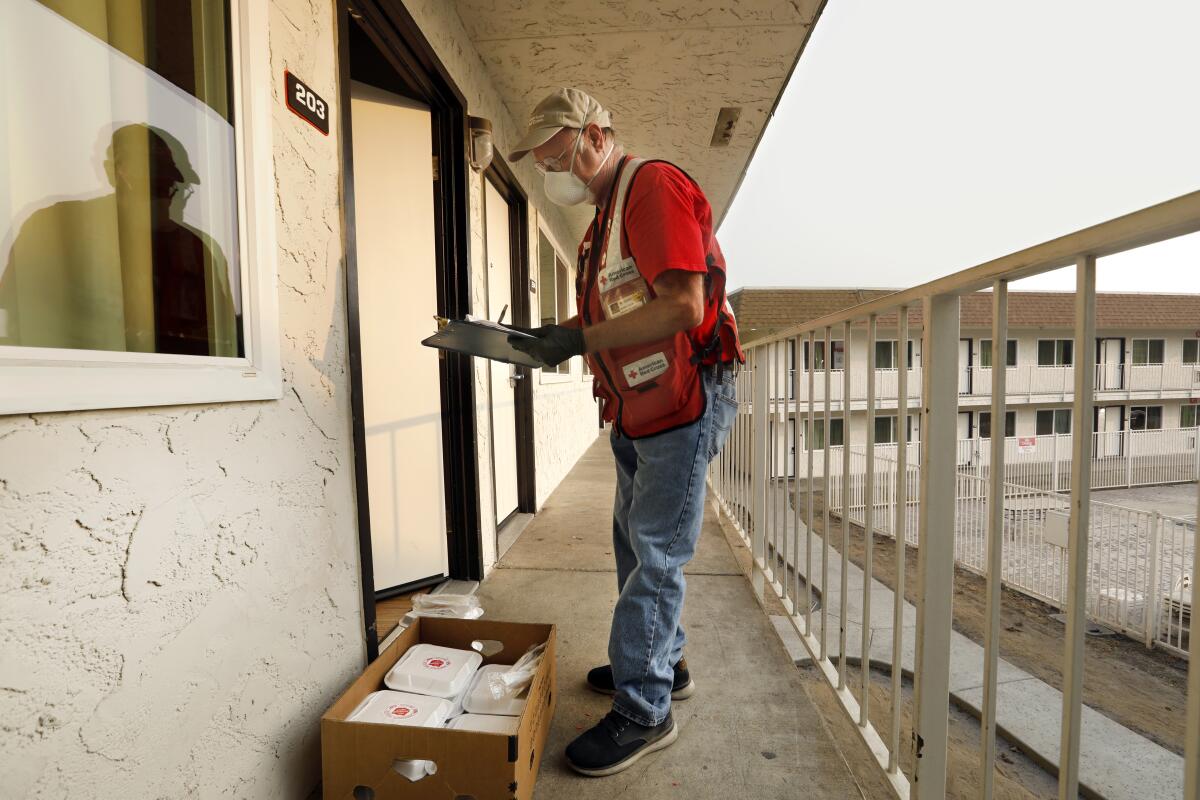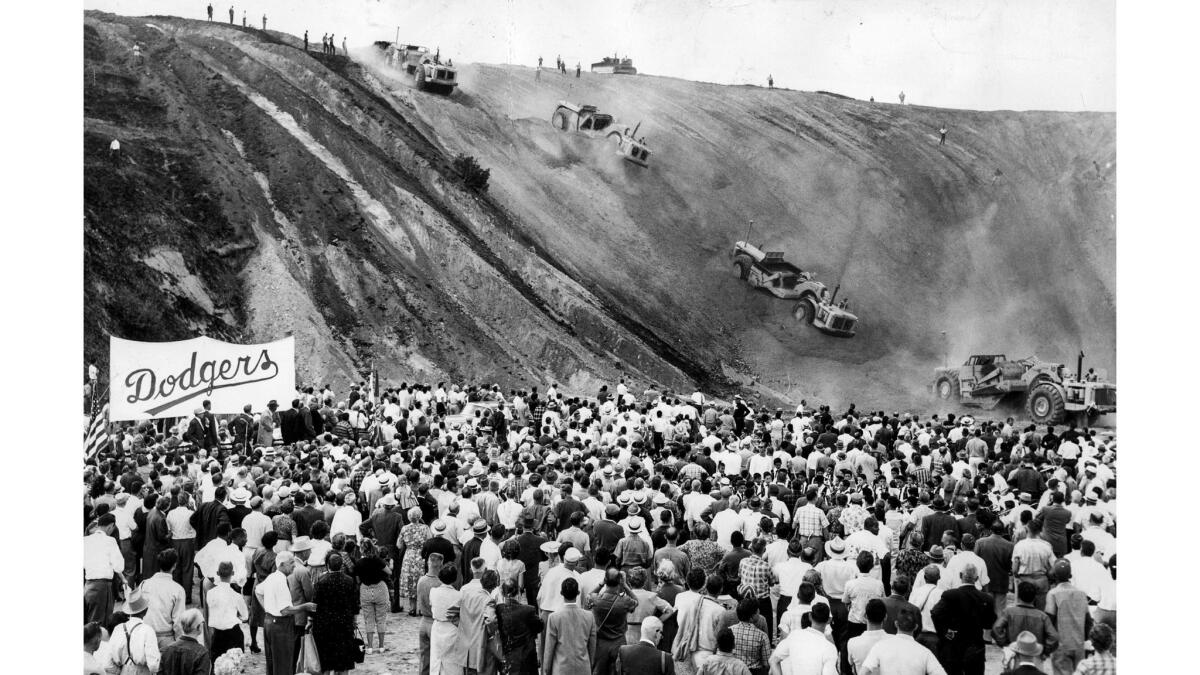Newsletter: How disaster relief has adapted

- Share via
With natural disasters striking amid the pandemic, long-standing relief practices have been forced to change.
TOP STORIES
How Disaster Relief Has Adapted
Wildfires are burning in the West. Hurricanes are pummeling the Gulf Coast. And across the U.S., the COVID-19 pandemic is wreaking havoc.
As a result, emergency services have had to adapt — for better or worse.
Start your day right
Sign up for Essential California for the L.A. Times biggest news, features and recommendations in your inbox six days a week.
You may occasionally receive promotional content from the Los Angeles Times.
There are no longer massive shelters in California where the coronavirus could spread among traumatized people running for their lives; the state prohibits large gatherings. That means no dining halls. No in-person counseling. No hugs.
In Butte County — where the North Complex fire rages and the per capita coronavirus rate is 33% higher than Los Angeles County’s — evacuees are being housed in motel rooms, not fairgrounds or school gymnasiums.
When large-scale disasters strike in states with looser restrictions than California’s, the Red Cross has instituted coronavirus precautions in group shelters: health screenings, mandatory face coverings, staggered meal times, and extra space between cots and tables.
More About the Fires
— The Bobcat fire continues to be a threat on several fronts, expanding to the northeast while all eyes remain on the southern foothill communities and the Mt. Wilson Observatory to the west.
— California’s 18 national forests will remain closed through at least Monday, according to a U.S. Forest Service statement.
— As smoke continues to shroud L.A. County, residents worry about long-term exposure.
California’s Progress Against COVID-19
After months of bleak coronavirus figures and forecasts, California officials are expressing cautious optimism about what is next.
Hospitals across the state are treating fewer patients with COVID-19 than at anytime since April. The percentage of tests coming back positive for the virus is lower than ever, proof that the state has reined in a massive surge that began this summer.
“We are turning the corner,” said Gov. Gavin Newsom in a news conference Wednesday as he listed multiple coronavirus metrics now “lower than what we’ve seen in a number of months.”
But these signs of progress also bring concerns that it could be erased. Many businesses are pushing for a faster reopening timeline. Experts fear that reopenings could coincide with flu season as well as with people becoming more complacent in their day-to-day lives, wearing masks less or choosing to attend gatherings likely to spread the virus.
More Top Coronavirus Headlines
— President Trump contradicted the director of the Centers for Disease Control and Prevention, Robert Redfield, and announced that widespread distribution of a coronavirus vaccine would begin as early as next month, further rattling the scientific and public health communities and stoking rival Joe Biden’s claim that Trump can’t be trusted to oversee development of a safe vaccine.
— The federal government has outlined a sweeping plan to make vaccines for COVID-19 available free to all Americans, even as polls show a strong undercurrent of skepticism.
For more, sign up for Coronavirus Today, a special edition of The Times’ Health and Science newsletter.
A Fuller Picture of Tragedy
It’s been a little more than a year since the dive boat Conception burst into flames, resulting in the deadliest maritime disaster in modern California history.
Though they don’t pinpoint a cause of the fire, newly released investigative reports by the National Transportation Safety Board describe the moments when the crew realized there was a fire on the Conception early on Labor Day in 2019.
By the time the crew on deck realized something was wrong, flames had engulfed the main deck, blocked stairways and trapped 34 people, killing all of them. Only five crew members survived.
A New Beginning and an End
When The Times announced that Gustavo Arellano would be its newest columnist — the paper’s first Latino columnist in nearly eight years, and only the sixth in its 139-year history — he made a pilgrimage to the final resting place of pioneering Times reporter Ruben Salazar.
“You shouldn’t care about what I’ll tell you; you should care about what I’ll show ustedes (that’s ‘y’all’ in Spanish),” Arellano writes. “So instead of pontificating from behind a desk, I’ll be where the action is.”
First stop: Pancho’s Mini Market near USC, a mercadito that closed for good when COVID-19 hit not only the business but all four family members who ran it.
FROM THE ARCHIVES
The origins of Dodger Stadium have a complicated history. The area known as Chavez Ravine had previously been a neighborhood filled with mostly Mexican American residents. They were pushed to relocate, and the last were evicted just months before construction began on the stadium.
Then, on this date in 1959, thousands of people came to watch giant earthmovers redistribute dirt as part of a groundbreaking ceremony. According to The Times, some spectators even scooped up handfuls of dirt to take home as a souvenir.
Construction ultimately took just under three years and cost $23 million. Dodger President Walter O’Malley wanted the park to be a “showplace” and looked to Disneyland for inspiration, though his grand visions of musical fountains and Italian sound systems were later scaled down. The stadium open on April 10, 1962, with the Dodgers playing the Cincinnati Reds — a game they lost.

Want more of the Los Angeles Times archives? We’re on Instagram.
CALIFORNIA
— Why did some L.A. hotels decline to house homeless people in the Project Roomkey program? A new report sheds light on some of the challenges encountered by government officials as they tried to secure rooms.
— The attack on two sheriff’s deputies was every police officer’s worst nightmare. But the Los Angeles County Sheriff’s Department’s response has raised alarms among some activists, lawmakers and agency watchdogs, who question whether the aggressive rhetoric is inflaming rather than easing tensions.
— At first, he thought it was a prank. But the threats were very real as false accusations spread that a Compton man was responsible for the shooting of two sheriff’s deputies, even as the department called the reports erroneous.
— Six months after online learning began, tens of thousands of students remain without adequate digital access. School districts in Los Angeles County report they still need nearly 50,000 computers and Wi-Fi hot spots.
Support our journalism
Subscribe to the Los Angeles Times.
NATION-WORLD
— Michael Caputo, a Trump administration health official embroiled in a furor over political meddling with the coronavirus response, is taking a leave of absence, the government announced. He apologized to his staff for a Facebook video in which he reportedly said scientists battling the coronavirus are conspiring against Trump and warned of an outbreak of gun violence in the U.S. if Trump lost the November election.
— An altered video, made to appear as though Democratic presidential nominee Joe Biden played a famous N.W.A song disparaging the police, was viewed more than 4.5 million times on Twitter by Wednesday afternoon. Trump helped fuel the video’s spread by tweeting it, twice.
— The Mexican government said it has requested information from the United States about claims that migrants were subjected to hysterectomies at a detention center in Georgia and that a migrant allegedly suffered sexual abuse at a facility in Texas.
— The Justice Department has charged five Chinese citizens with hacks targeting more than 100 companies and institutions in the U.S. and elsewhere. The indictments are part of a broader effort by the Trump administration to call out cybercrimes by China.
HOLLYWOOD AND THE ARTS
— It’s HBO versus Netflix for Emmy dominance this weekend. But numbers don’t tell the whole story, columnist Mary McNamara writes.
— KCRW‘s station manager has confirmed that the Santa Monica-based NPR affiliate has accepted buyout offers from 24 employees and announced that an additional four workers will be laid off.
— Blues singer Lady A is fighting back with a new lawsuit months after country band Lady A sued her in an ongoing dispute over their shared moniker.
— Planning to visit a newly reopened art gallery? Here’s what it’s like to step inside four of them.
BUSINESS
— Albertsons, Kroger and other big grocery stores are supporting a California ballot measure that would increase penalties for shoplifting and make it harder for those convicted of certain nonviolent property and drug crimes to get early parole.
— As Trump’s ban on TikTok nears, some of the social video platform’s biggest stars, including Charli and Dixie D’Amelio, are joining rival app Triller. Meanwhile, Trump said he’s not happy with what he’s heard about the terms of Oracle Corp.’s bid for the Chinese-owned video app.
— The Federal Reserve is likely to keep interest rates pinned near zero at least through 2023, according to projections released Wednesday that also show officials are more upbeat about the near-term outlook for the economy.
SPORTS
— The Big Ten reversed course Wednesday, announcing its universities will play football this fall. Now the pressure is on for the Pac-12, the last remaining league to opt out of a fall season over coronavirus concerns.
— The Dodgers clinched a playoff spot with a victory over the Padres.
— The Sparks’ Candace Parker revolutionized basketball, but she’s not done.
Free online games
Get our free daily crossword puzzle, sudoku, word search and arcade games in our new game center at latimes.com/games.
OPINION
— Too many Americans believe a “coup” or “force” may be needed to protect their way of life, columnist Nicolas Goldberg writes.
— Climate change is affecting wildfires, but Newsom and legislators still need to do more, according to columnist George Skelton.
WHAT OUR EDITORS ARE READING
— Atty. Gen. William Barr told prosecutors to consider charging violent protesters with sedition under a rarely used federal law addressing conspiracies to overthrow the government, the Wall Street Journal reports, citing people familiar with the conversation. (Wall Street Journal)
— A pro-Trump youth group is enlisting young people — some of them minors — in a secretive troll campaign that’s drawn backlash from Facebook and Twitter. (Washington Post)
ONLY IN CALIFORNIA
Ballet Folklórico de Los Ángeles has been around for nearly a decade, but it wasn’t until last week that it gave its first drive-in performance — because of the COVID-19 pandemic, of course. “Rarely has the zapateado of tapping shoes met with honking horns and flashing headlights in such a cacophony,” writes Laura Zornosa of the show in Fullerton. “Vibrant skirts flowed like waves and the audience was packed — with cars.”
Comments or ideas? Email us at headlines@latimes.com.
Sign up for Essential California
The most important California stories and recommendations in your inbox every morning.
You may occasionally receive promotional content from the Los Angeles Times.






